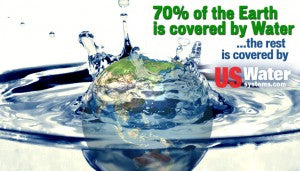Water Treatment for Breweries and Distilleries
It's a fact that all distilled spirits and beers have one common ingredient - the most essential ingredient of the product, that being water. Unfortunately, most water is a lot more that just H2O, which often adversely impacts the final product. Chlorine, iron, manganese, chloramines, tannin, nitrate, TDS, sodium, chlorides, sulfates and many other elements in the water are not desirable for distilling alcohol or brewing beer.

Beer Brewing
Beer contains approximately 95% water, and the importance of the water to final beer quality cannot be over-estimated. Water impacts beer in three ways: (1) Water ions are critical in the mashing process for all grain brewers, where the character of the water determines the efficiency and flavor of the extracted wort; (2) water also affects the perceived bitterness and hop utilization of finished beer; and (3) water adds flavor directly to the beer itself because water is the largest single component in finished beer. Depending upon the type of beer, certain water ions will greatly affect the final product: magnesium, calcium, sulfate, chloride, carbonate and sodium. US Water does not brew beer, but the best brewers do start with the highest purity and add back certain ions depending upon the type of beer they are brewing. US Water specializes in providing high-purity water for all distillation and brewing companies, especially smaller companies, micro-breweries and distilleries that uses under 30,000 gallons per day.
Distilled Spirits
The age-old tradition of distilling whiskey involves just three simple ingredients: water, yeast, and barley. It is the purity of these elements that creates the complexity of character evident in the finest single malts. It is difficult to overstate the importance of water quality in the distilling of a premium single malt whiskey or scotch. Water literally is the lifeblood of the product. Apart from its direct role as an ingredient, water naturally informs the character of the remaining elements used in distilling. Vodka is also a distilled spirit that is enhanced with clean, clear water. US Water is the simple solution to solving all your water treatment problems for distilled spirit alcohol production.
Treatment Systems
To properly treat water for brewing and distillation, it is important that all unnecessary contaminants be removed. The most effective method for removing the largest spectrum of contaminants is Reverse Osmosis. Prior to the reverse osmosis system, chlorine and other organics are removed by a backwashing carbon filter and if the water contains iron/manganese or sulfur, it must also be removed. If the water is over 4 or 5 grain hard (over 70 mg/l hardness), then a water softener or anti-scalant must proceed the reverse osmosis system. After the water is processed through the reverse osmosis system it is stored in an atmospheric storage tank that is from 100 gallons to up to 2,000 gallons in capacity. Some distilleries opt to put the water from the RO system through a deionization (DI) system which results in absolutely pure water with a pH of 7.0. After the storage tank, there is a re-pressurization pump that delivers the water to the desired sources at approximately 60 PSI up to 22 GPM. In order to prevent any airborne bacterial contamination, there is an ultraviolet (UV) light in-line to destroy any bacteria. US Water offers a variety of monitoring and water quality options to monitor your water quality. Additionally, many breweries utilize a calcite filter which adds a small amount of calcium carbonate back to the water for flavor and to raise the pH. That is your choice - there is no right or wrong answer.






1 comment
Leave a comment
Please note, comments need to be approved before they are published.